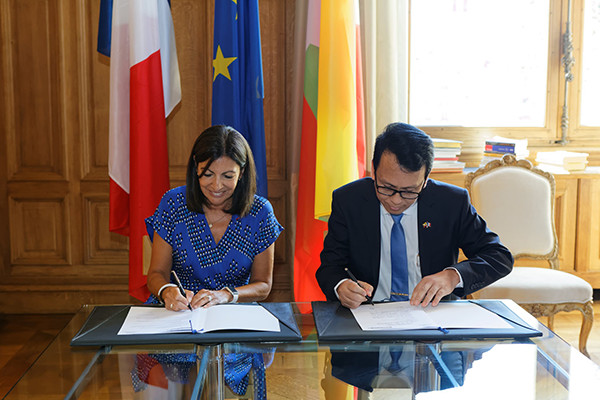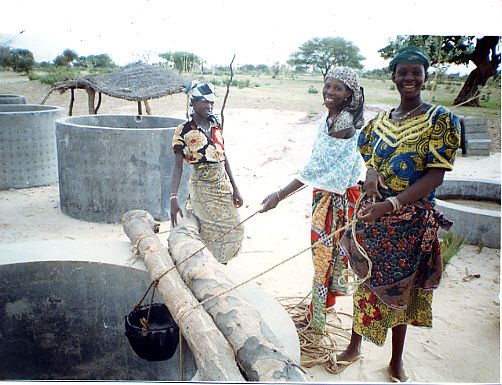City of Paris’ international action
Service
Mise à jour le 02/05/2017
Attention, cet article n'a pas été mis à jour depuis le 02/05/2017, il est possible que son contenu soit obsolète.

Sommaire
Paris, a capital of international influence, is actively involved in global issues. In areas such as solidarity initiatives, combating climate change, cultural exchanges, European policy and cooperation agreements, it seeks to make its expertise available to others, and also to build on experiments conducted elsewhere for the benefit of Parisians.
Paris, a world city
Paris is a city of creation and dialogue, built on the cultural and linguistic contributions of nationalities from around the world who have nourished the city and provided it with unique diversity, richness and strength. Faced with the major challenges of sustainable development and inclusive growth, exchange of best practice between cities is helping expand know-how and build effective solutions for the benefit of the people and the region.

Accord de coopération avec Rangoun
Credit
Henri Garat
More than 70 cooperation pacts have been signed to date with cities around the world in order to develop responses to the great shared challenges together.
Paris and Europe
Paris intends to increase knowledge of and love for Europe, by further bridging the gaps with European cities including Rome, Berlin, Amsterdam, London, Vienna and Lisbon.
Through the support it provides to the House of Europe and involvement in the activities of associations in European cities, Paris is seeking to make Europe more tangible and to educate young people about European issues. This is the purpose of the Journées de l’Europe (European Days), held every year in May on the City Hall forecourt, and Label Paris Europe, a call for projects which each year provides funding for concrete European projects.
Paris Climate action plan
Paris has taken very early into account citizens’ concern at national and international level, on environment related issues and has decided to tackle climate change. Since 2007, the City of Paris has developed an ambitious Climate Plan, based on a broad action plan in a wide range of areas: mobility, habitat, urbanism, resource and waste management, food … After having convened the Climate Summit for Local Leaders during COP 21 in 2015, Paris has continued to play an active role on the international scene, for example chairing the C40.
An enhanced international action with C40
The C40 Cities Climate Leadership Group is a global network of cities committed to address climate change, created in 2005. It connects more than 90 of the world’s greatest cities, representing over 650 million people and one quarter of the global economy. A year after COP21 in Paris and only few weeks after the entry into force of the Paris Agreement, the C40 elected Anne Hidalgo Chair in December 2016 in Mexico. The Mayor of Paris succeeded Ken Livingstone, Mayor of London, David Miller, Mayor of Toronto, Michael Bloomberg, Mayor of New York and Eduardo Paes, Mayor of Rio, and became the first woman Chair of C40.
As new C40 Chair, she aims to enhance two programs directly related to Parisian initiatives: Reinventing Cities (link), a new global competition to bring to the cities of C40 the best ideas of innovative solutions forward and Data City, a project to present the best start-ups of C40 cities with the available data in order for them to improve the quality of life in the cities.
Anne Hidalgo wants also to emphasize women leaders in tackling climate change via the Women4climate program.
Further objectives of C40 cities are to implement Paris Agreement (link) adopted at COP21 and to limit the global temperature increase to 1,5°C.
90 cities form now C40, among them: Amman, Athens, Bombay, Buenos Aires, Dakar, Djakarta, Hong Kong, Kuala Lumpur, Cairo, Cape Town, London, Melbourne, Milan, Montreal, Moscow, New York, Beijing, Rome, San Francisco, São Paulo, Seoul, Vancouver, etc.
The Paris of solidarity and cooperation
One of the priorities of the City of Paris’ international action is solidarity with the poorest populations, to which it allocates more than €6.5 million per year.
International response to AIDS : nearly €26 million pledged since 2001
Because they save lives, these sums destined for projects by NGOs and associations are the largest items in the budget allocated to international solidarity.
>> €1.8 million has been set aside for this great cause in 2016, spread across 20 different countries and benefitting 500,000 people worldwide.
Helping access to water and sanitation
Improving access to water and sanitation in countries most in need is another priority of the City of Paris’ international action. The Paris authority was one of the first in France to enforce the Oudin-Santini Law, when it created an international “Water and Sanitation Solidarity” scheme in 2005. The City of Paris is thus contributing to the achievement of the Millennium Development Goals adopted by the UN.
Thanks to contributions by Parisians in their water bill (around 60 eurocents/year for a family of four), Paris has supported nearly 70 projects in 30 countries with more than 1.2 million beneficiaries and a total of €7M raised.

Photo Eau Afrique coopération
Credit
Ville de Paris
Combating waste
The most recent pledge by the City of Paris is to donate a portion of revenue from waste collection to international solidarity. In 2025, nearly 70% of the world’s population will live in cities, each year generating more than 2 billion tons of solid waste, with adverse effects on human health and the environment. To meet this crucial challenge and in the wake of a positive assessment of the implementation of the "Water Solidarity" scheme, Paris has decided to launch a similar scheme enabling waste collection and international solidarity operations.
Combating global warming and promoting sustainable cities
In August 2016, when Anne Hidalgo became president of the C40 - a London-based network of 85 cities (including New York, San Francisco, Vancouver, London, Moscow, Rome, Milan, Athens, Seoul, Mumbai, Jakarta, Melbourne, Hong Kong, Beijing, São Paulo, Buenos Aires, Cape town, Cairo, etc.), she targeted several solutions in order to make quality of life in cities widely available: launch of a call for innovative urban projects, development of projects with French and international start-ups, etc. The Mayor of Paris also encourage new investment to fund the sustainable and resilient cities initiative.
Urban technical cooperation
Technical cooperation between Paris and other cities hinges on a response by experts from City of Paris departments and agencies and its partners. Paris has for several years been supporting large-scale projects in various fields: transport, sanitation, health, cleanliness, green spaces, etc. These cooperations are true laboratories of experimentation and the aim is for them to diversify in the coming years to cover the broad spectrum of priority areas for Paris. Paris is conducting these projects with the help of institutional, technical and financial partners like the French Ministry of Foreign Affairs and International Development and other backers like the European Commission or the French Development Agency (AFD).
Emergency aid
Paris provides financial aid and expertise to countries facing emergency situations. This solidarity is evidenced through financial support to victims of conflicts and natural disasters.
>> Since 2001, more than €4.5 million has been given to NGOs working in crisis areas.
The Paris Southern Hemisphere Co-Development Award: Label Paris co-développement sud
The City of Paris assists with access to its funding for migrant associations that are based and active within the Paris region. It supports co-development initiatives and works with immigrant populations working for sustainable development in developing countries in the Southern Hemisphere.
Paris defends universal values
The City of Paris is the embodiment of human rights and individual and press freedoms. This is a privilege, but also a responsibility: that of promoting these values wherever they are violated. Paris’ commitment takes various forms: supporting Parisian associations defending human rights in the world, like Reporters Without Borders, the International Federation for Human Rights and La Maison des Journalistes, participation in the network of cities against the death penalty: “Cities for Life, Cities Against the Death Penalty”, support for the Lucas Dolega Award for photographers, the association Cartooning for Peace, etc.
Honorary Citizens of the City of Paris
This high distinction, awarded to very few, is reserved for the most emblematic defenders of human rights around the world. It has been awarded to great resistance fighters against dictatorship and cruelty. Fifteen prominent people have earned this distinction since 2001, by means of a Council of Paris vote.
Paris, shelter-city
The City of Paris supports La Maison des Journalistes in the setting-up of temporary reception facilities for foreign journalists who are refugees or asylum seekers in France. La Maison des Journalistes every year hosts 30 foreign journalists for a six-month period and since it opened has hosted 273 journalists from 60 different countries.
Paris also joined the ICORN - International Cities of Refuge Network - in 2011 alongside twenty or so other cities like Mexico City, Oslo, Stockholm and Barcelona, expanding this international network for writers in exile.
Paris, international capital of innovation, culture and education
Paris is one of the world capitals of innovation and has a unique cultural offering. Tourism, fashion and luxury, gastronomy, culture, education, health, sustainable development and science are sectors in which international exchanges are not an exception but a daily reality.
Paris has nearly 40 incubators and more than 3,000 start-ups. Among them are Le Cargo, the largest European innovation platform and Le Tremplin, a pioneering platform dedicated to sport. The latter results from a drive by the Paris authority to create jobs and encourage the emergence of a real sports industry in Paris and contains an incubation, training, experimentation and monitoring centre and an innovative sports platform. The aim is to reinvent sport for the future, while attracting international companies. Another creation, the Welcome City Lab, is the first Parisian incubator devoted to tourism and recreation - reflecting our ambition to make Paris a city of innovation in tourism.
Paris, cultural capital open to the world
An open cultural capital, Paris distinguishes itself by a cultural offering which is unique in the world. The importance and quality of its institutions and wealth of artistic endeavours generate strong international appeal. Two priorities for action have been determined for international cultural projects: to enable the Parisian art scene to export abroad and to welcome artists and intellectuals from around the world.
Paris has several tools to achieve its ambitions, among which artist residencies, an agreement with the Institut français and the Alliance française, active participation in certain networks like the CGLU Committee on Culture and the ICORN network of shelter-cities for exiled artists…
Classes Duo: international school exchange programmes via digital media
Classes Duo is an international school exchange programme set up by Paris City Hall in elementary schools. The aim is to increase children’s interest in foreign cultures, and whet their appetite for discovering other countries, talking with children living there or learning foreign languages. Bilingual speakers bring to life these discussions which can complement language classes. Classes Duo are set up regularly with other countries, including French-speaking countries.
Votre avis nous intéresse !
Ces informations vous ont-elles été utiles ?
Attention : nous ne pouvons pas vous répondre par ce biais (n'incluez pas d'information personnelle).